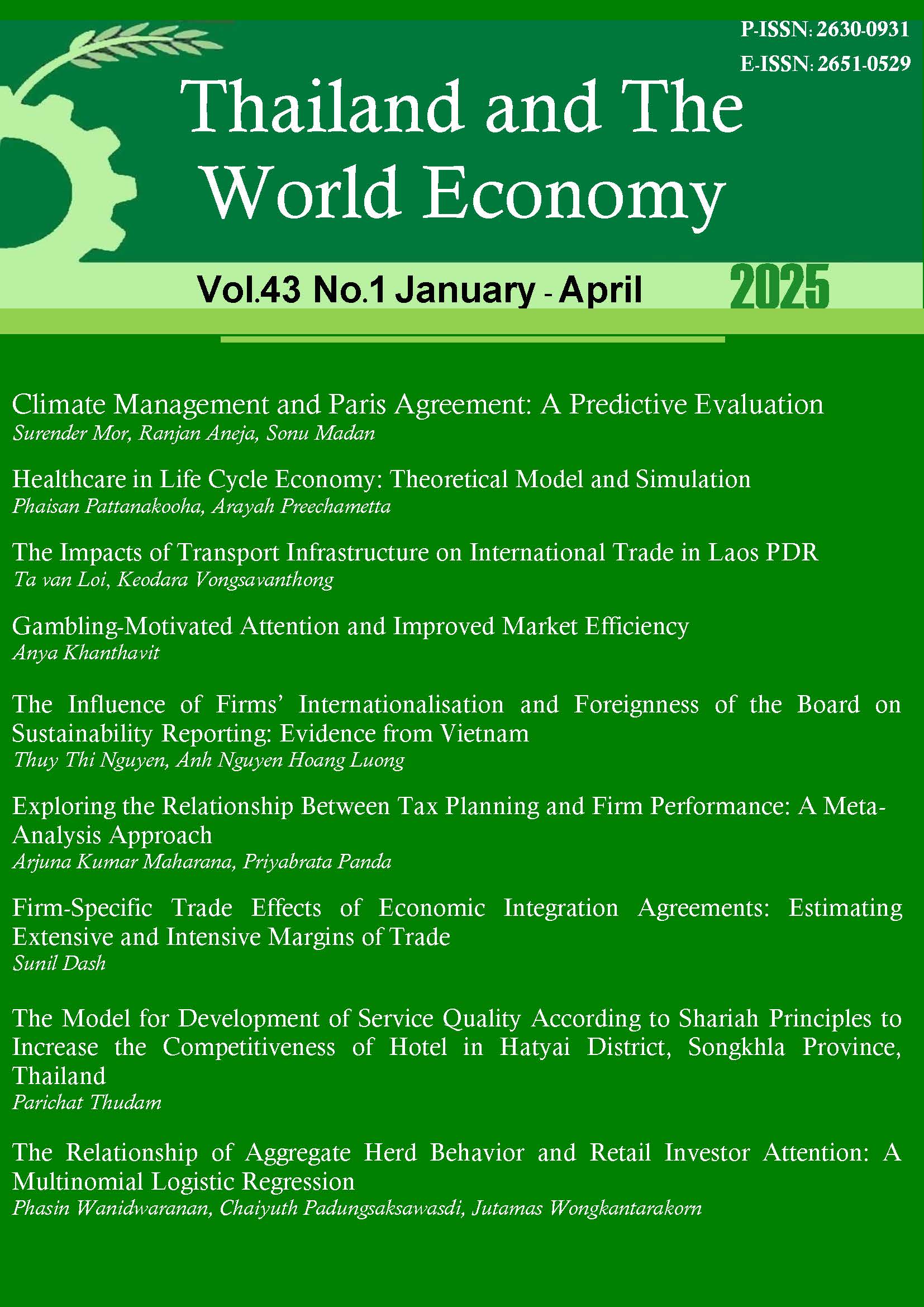Healthcare in Life Cycle Economy: Theoretical Model and Simulation
คำสำคัญ:
Theoretical overlapping generation model, healthcare assets, growth rate of population, taxes and subsidiesบทคัดย่อ
This article aims to develop the theoretical overlapping generation models with the unstable healthcare system due to the problem of missing trading markets between young and old generations. The main healthcare system in Thailand is Universal Coverage (UC) which covers around 48 million Thai people. The costs of the healthcare system in Thailand are rising every year, while Thailand has been in an aging society too early.
The theoretically developed models in this article show the main results that first, the different generations (the young and old households) could not exchange their healthcare assets. Then, the government needs to run a balanced budget to collect lump sum taxes from the current young households and transfer those taxes as healthcare subsidies to the current old households; this system is PAYG (Pay-As-You-Go). The PAYG could be sustainable if the growth rate of the population is greater than or equal to the households’ discount rate. However, under the aging society in Thailand, the average growth rate of the population in the last decade has been negative. Therefore, this system is unlikely sustainable in the long run.
เอกสารอ้างอิง
Abu-Zaineh, M., Awawda, S., & Ventelou, B. (2018). Who bears the burden of Universal Health Coverage? An assessment of alternative financing policies using an overlapping-generations general equilibrium model. (AHEAD Working Paper No. 02/2018). Applied Health, Equity and Development Research Network.
Abu-Zaineh, M., Awawda, S., & Ventelou, B. (2020). Who bears the burden of Universal Health Coverage? An assessment of alternative financing policies using an overlapping-generations general equilibrium model. Health Policy and Planning, 35 (7), 867 – 877.
Brook H., Robert, K., Emmett B., Lohr, K. N., Newhouse, J. P., Ware, J. E., … Newhouse., J. P. (2006). The health insurance experiment: A classic RAND study speaks to the current health care reform debate. Retrieved from https://www.rand.org/pubs/research_briefs/RB9174.html.
Cass, D. (1965). Optimum Growth in an Aggregative model of capital accumulation. Review of Economic Studies, 32 (3), 233-240.
Central Provident Fund. (2024). CPF-Overview. Retrieved from https://www.cpf.gov.sg/member/cpf-overview.
Central Provident Fund. (2024). Growing your savings: CPF interest rates. Retrieved October 27, 2024, from https://www.cpf.gov.sg/member/growing-your-savings/earning-higher-returns/earning-attractive-interest.
Central Provident Fund. (2024). Growing your savings: Investing your savings with CPF, investment schemes. Retrieved October 27, 2024, from https://www.cpf.gov.sg/member/growing-your-savings/earning-higher-returns/investing-your-cpf-savings.
Central Provident Fund. (2024). Growing your savings: Understanding the special discounted shares scheme. Retrieved October 27, 2024, from https://www.cpf.gov.sg/member/growing-your-savings/earning-higher-returns/special-discounted-shares-scheme.
Central Provident Fund. (2024). Growing your savings: Boost your savings with workfare income supplement. Retrieved October 27, 2024, from https://www.cpf.gov.sg/member/growing-your-savings/government-support/workfare-income-supplement.
Department of Provincial Administration. (2024). Official population statistics. The civil registration (monthly) Registration Management Office. Retrieved October 27, 2024, from https://stat.bora.dopa.go.th/stat/statnew/statMONTH/statmonth/#/view.
Diamond, Peter. (1965). National debt in a neoclassical growth model. American Economic Reviews, 55 (5), 1126 – 1150.
Erosa, A., & Gervais, M. (2001). Optimal taxation in infinitely-lived agent and overlapping generations models: A review. Federal Reserve Bank of Richmond Economic Quarterly, 87 (2), 23 - 44.
Frankovic, I., Kuhn, M., & Stefan, W. (2016). Medical care within an OLG economy with realistic demography. (Working Papers No. 3/2016). Vienna Institute of Demography.
Garriga, C. (2019). Optimal fiscal policy in overlapping generation models. Public Finance Review, 47 (1), 3 – 31.
Koopmans, T.C. (1965). On the Concept of Optimal Economic Growth. In J. Johansen (Eds), The Econometric Approach to Development Planning (pp. 225-287). North Holland, Amsterdam: North-Holland Publishing Company.
Manning, W. G., Newhouse, J.P., Duan, N., Keeler, E. B., & Leibowitz, A. (1987). Health insurance and the demand for medical care: Evidence from a randomized experiment. The Scandinavian Journal of Economics, 77 (3), 251-277.
Merkur, S., Anell, A., Blume, S., Janlöv, N., Hanspers, K., & Glenngård, A. H. (2023). Sweden: Health system review 2023. European Observatory on Health System and Policies. Health Systems in Transition, Vol. 25 No. 4. Retrieved October 27, 2024, from https://eurohealthobservatory.who.int/publications/i/sweden-health-system-review-2023
Minchung, H., & Yamada, T. (2019). Population aging, health care, and fiscal policy reform: The challenges for Japan. The Scandinavian Journal of Economics, 121 (2), 547-577.
Ministry of Public Health. (2017). Statistical Thailand 2017. Retrieved October 27, 2024, from https://spd.moph.go.th/public-health-statistics/
Ministry of Public Health. (2017). Health at a glance Thailand 2017. Retrieved October 27, 2024 from https://spd.moph.go.th/wp-content/uploads/2022/08/health-at-a-glance-thailand-2017.pdf
National Health Security Office (NHSO). (2022). NHSO annual report 2022. Retrieved October27, 2024, from https://eng.nhso.go.th/view/1/Annual_Reports/EN-US
New Jersey Division of Pensions & Benefits. (2024). Health benefits coverage – enrolling as a retiree. Retrieved October 27, 2024, from https://www.nj.gov/treasury/pensions/documents/factsheets/fact11.pdf
Japan Health Policy Now. (2024). What is Japan health policy now? Retrieved October 27, 2024, from https://japanhpn.org/en/home-2/
John Hopkin University. (2024). Retirement Eligibility. Retrieved October 27, 2024, from https://hr.jhu.edu/benefits-worklife/retirement/planning-for-retirement/retirement-eligibility/
Phelps, E. S. (1961). The golden rule of accumulation: A fable for growth men. American Economic Reviews, 51 (4), 638 – 643.
Phelps, E. S. (1965). Golden rules of economic growth: Studies of efficient and optimal investment. New York: W. W. Norton & Company
Ramsey, F. P. (1928). A mathematical theory of saving. The Economic Journal, 38 (152), 543-559.
The Japanese Healthcare System. (2024). Retrieved November 25, 2024, from https://www.internationalinsurance.com/health/systems/japan.php
U.S. Office of Personnel Management. (2024). The Federal Employees Health Benefits (FEHB) Program. Retrieved October 27, 2024, from https://www.opm.gov/healthcare-insurance/healthcare/
ดาวน์โหลด
เผยแพร่แล้ว
รูปแบบการอ้างอิง
ฉบับ
ประเภทบทความ
หมวดหมู่
สัญญาอนุญาต
ลิขสิทธิ์ (c) 2024 Thailand and The World Economy

อนุญาตภายใต้เงื่อนไข Creative Commons Attribution-NonCommercial-NoDerivatives 4.0 International License.







